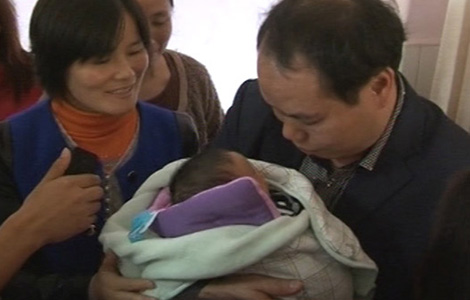Launch zone challenges
Updated: 2013-11-11 00:18
By Andrew Moody (China Daily)
|
|||||||||||
Experimental project in Shanghai could herald the take-off of next round of economic reforms, Andrew Moody reports
|
 |
Acollection of warehouse developments facing the breeze of the East China Sea might seem an unlikely symbol of China's future.
The Waigaoqiao Free Trade Zone in the north east of Shanghai's Pudong district and set up as a bonded zone in the 1990s, is one of four areas designated to be the China (Shanghai) Pilot Free Trade Zone.
The FTZ, which consists of just 29 sq km, could be the most important economic reform in China since the establishment of the Shenzhen special economic zone in the early 1980s, which paved the way to China becoming the manufacturing workshop of the world.
This time, however, the FTZ is not about manufacturing but the opening up of China's service sector — and, in particular, financial services, to the rest of the world.
It could herald Shanghai eventually becoming a global financial hub, with top Chinese banks, such as Bank of China, competing with Wall Street giants such as JPMorgan Chase and also lead to the yuan becoming a major international reserve currency.
All this was still in the future when the FTZ, the territory of which also includes the Pudong Airport Free Trade Zone, Yangshan Free Trade Port area and the Waigaoqiao Free Trade Logistics Park, was officially launched at the end of September.
For now it is just a three-year pilot and a testing of the water as to how certain key reforms would work if they were introduced across China as a whole.
Chief among these are interest rate liberalization (giving banks the freedom to set their own interest rates and able to compete for deposits as opposed to them being centrally set as in the rest of China) and greater yuan convertibility than the current tight foreign exchange restrictions allow.
Businesses in 18 key areas will be allowed to operate in the zone, including banking, legal services, travel agencies, human resource consultancies, medical services and even foreign businesses offering entertainment venues and those producing and selling gaming consoles.
There has been much focus so far on the "negative list" on what will not be allowed in the zone, including gambling businesses, golf courses and any businesses auctioning off cultural relics or involved in pornography.
Thousands of domestic businesses have already tried to register in the zone with the FTZ service center receiving some 500 enquiries a day.
Citibank and DBS are so far the largest foreign financial institutions to announce establishing sub-branches in the zone. Many others are expected to announce their involvement.
Over at her sixth floor offices in Pudong New Area, Jane Wang, tax partner at business advisers PwC China, says she has been inundated by requests from clients for advice.
"It has been overwhelming. It is a really big topic at the moment. Everyone is looking at it and trying to understand the details and the background and what kind of policy the government will issue in the future," she says.
It is the detail that everyone is waiting for. Many are expecting further announcements after the Third Plenary Session of the 18th Communist Party of China Central Committee, which begins on Nov 9.
Long Guoqiang, director-general of the General Office of the Development Research Center of the State Council, said last month the government would be "prudent" in implementing policies.
"The Shanghai FTZ will be the pilot and explorer of China's economic upgrading," he said.
A key question remains as to the extent of the convertibility of the yuan within the zone. Currently in the rest of China companies wanting to change large amounts of the Chinese currency have to apply to the State Administration of Foreign Exchange. Chinese citizens can individually exchange $50,000 of yuan in any one year. There is no problem with currency transactions if they are for the trade of physical exports and imports. The restrictions apply to currency trades on their own. What is not known at present is what limits, if any, will apply in the FTZ area.
The other major uncertainty is to what extent the banks, foreign and domestic, will be able to compete with each other by setting their own interest rates. It is assumed they will only be able to offer financial services to those companies registered within the FTZ.
One of the major challenges for those setting the framework for the establishment of the zone is preserving a border between the FTZ and the rest of China and reducing the risk of any arbitraging opportunities.
May Yan, a banking analyst for Barclays Capital in Hong Kong, says it is far easier to place a border around a zone where goods are manufactured than one that applies to services and, in particular, the movement of money.
"You can actually control physical goods. There is only so much you can actually smuggle but finance is just numbers in a computer that can be switched very quickly. The wiring of money is so easy."
The "general plan" for the zone states the convertibility under the capital account will be introduced gradually through a series of trial programs as will market-orientated interest rates.
He Weiwen, co-director of the China-US/EU Study Center at the China Association of International Trade in Beijing, says the authorities are being understandably cautious.
"In the broad master plan of the free trade zone the wording referred to the full convertibility of the yuan. In the State Council's notice this wording was removed because it might be too early to say that. However, the currency will have to be convertible within the capital account, or the free trade zone will have no meaning," he says.
Simon Gleave, regional head of financial services for KPMG Asia-Pacific, based in Beijing, says the problem for the authorities is that they are attempting something completely new.
"No country has tried to open up and deregulate at this stage of its development and when it is of the scale that China is now. It is already the world's second-largest economy so to try and create a convertible currency in one go is a very big ask and a very big unknown in terms of the effect it might have," he says.
"The implications for the rest of the world of getting it wrong are quite important. That is why it is important to use some sort of pilot area which is already in the center of China's capital markets."
One of the aims of the planners is to make the FTZ attractive to multinationals and the hope is that a number of them will make the zone their Asia headquarters. Many multinationals now do the majority of their Asia business on the Chinese mainland but have their base in Singapore or Hong Kong. This involves a lot of unnecessary travel for many senior executives visiting their operations in the world's second-largest economy.
The reason why they do this is because under the current currency conversion rules they would not be able to transfer money between their various Asia locations and their headquarters, if it was in China.
If these currency restrictions were removed, it would make no difference if the headquarters were in the FTZ, Singapore or elsewhere. Money could flow freely in and out of the zone. The problem of getting money out of the rest of China would remain for the zone-based company but it would be at no disadvantage to a company based elsewhere in Asia.
He at the China-US/EU Study Center at the China Association of International Trade believes it is not clear yet whether multinationals will move to the zone.
"Most companies have their manufacturing or research and development base. To have a regional headquarters in China, you need to be able to do international settlements. This is a step in the right direction but it is too early to say."
Some have argued that regional CEOs would be put off moving to the mainland because of higher tax rates compared with Singapore or Hong Kong, particularly on their own personal remuneration packages.
In his office in 21st Century Tower in Pudong, David Wu, general manager and managing partner of GMP Talent International, doubts whether that would be a deterrent.
He recruits executives from 600,000 yuan ($98,000) a year to some on 3 million yuan.
"Most companies offer a tax equalization calculation. They look at the net salary after tax and might add some housing or children's education allowances so that people will take a China package. It is quite a common benefit in today's market," he says.
As well as multinationals, the FTZ could be an ideal location for Chinese companies looking to expand their international activities.
Kevin Chen, principal of international management consultants A.T. Kearney, speaking from his office in Hang Seng Tower in Pudong New Area, says many are now at the stage at which the FTZ would be a useful platform.
"At the beginning many Chinese companies had just one investment in a foreign country which was just about doable with having an existing base in China and the current currency restrictions," he says.
"We have advised one company that has an existing German operation but is now looking to add another in Brazil. It really needs the ability to move money around globally and being located in the free trade zone could be the solution for this."
Chen says the zone is not just proving attractive to these larger globally ambitious companies but also entrepreneurs who think something good might come.
"There are a number of entrepreneurs from Zhejiang and Jiangsu (two provinces that are known throughout China for their entrepreneurs) who are registering in the zone. They don't know what is going to happen there but they think it might be an opportunity to make money."
Mark Purdy, chief economist and managing director of economic research for management consultants Accenture, who was visiting his company's Shanghai Central Plaza offices, believes the FTZ might even prove to be a China Silicon Valley.
"If it works, you will get these
network effects of bringing in and encouraging some hopefully highly innovative private sector companies. So you can create a mini Silicon Valley."
Because businesses in the medical sector are allowed to set up in the zone, there has even been speculation that foreign-owned hospitals will sprout up on the green areas around the existing warehouses. If not hospitals, the zone could be an unlikely center for cosmetic surgery and other specialist procedures.
"I actually don't see where in the zone they could set up hospitals. It is a bit far away from the major population centers," says Gleave at KPMG.
The authorities are keen that the FTZ is not becoming a new Lujiazui, Shanghai's financial district with skyscrapers that draws people away from the main city area. It is anticipated many companies will just rent a room or a floor within the zone. The FTZ regulations and benefits will only cover their activities within the zone and not those in the rest of China.
Steven McCord, local director of China retail properties research at Jones Lang LaSalle, based on the 25th floor of Plaza 66 with a dramatic high view of the city, says the establishment of the FTZ is not necessarily going to change the landscape of the areas involved in the pilot.
"They are not going to build any Grade A office towers like this. It is clear to us that so-called high-end office areas are on the negative list and will not be permitted. This is to ensure that the good development goes into the Central Business District," he says.
"There won't be a huge demand for office space within the free trade zone. Most companies will set up a representative office, perhaps just a room of several hundred square meters."
McCord adds that when subway line 16 is completed some areas of the zone will be within an hour of the city center and some people may want to commute, but he doesn't believe it will be an attractive place for further development.
"Some of it is on reclaimed low lying land and if you had a category three typhoon the sea might inundate some of the land. I wouldn't want to live there personally," he says.
But whether the FTZ proves to be a success or not does not revolve around these largely secondary practical issues.
"It is about the upgrading of the Chinese economy and the move away from manufacturing to service sector industries," says Chen at A.T. Kearney.
"The future growth of manufacturing in China is limited and we need to develop a service sector base that can take the economy onto the next stage."
One uncertainty at present is whether the FTZ model is going to be replicated in other cities in China such as the northern port city of Tianjin or Chongqing in the western part rather than a precursor to reforms rolled out across the whole of China.
"I think if we can have a successful test within two or three years we will have other similar free trade zones in Guangzhou, Tianjin and Chongqing as a second phase," says He at the China-US/EU Study Center at the China Association.
"If they are successful it can be introduced to the rest of the country. It is therefore important that the Shanghai free trade zone is reproductive."
Yan at Barclays Capital in Hong Kong says it will certainly be of interest to the foreign banks whose activities are currently heavily restricted in China.
"In China foreign banks have the disadvantage of being very small and, not having a lot of branches, they don't have a deposit base yet they are subject to the same loan to deposit ratio of 75 percent. If they are given more freedom they will be very interested."
There has been concern expressed in Hong Kong that if the zone is successful, it could pave the way for Shanghai to replace the special administrative region as China's key financial center.
"I think the most likely scenario is that they would be complementary," He says.
"If you look at Europe there are many financial centers, including London, Frankfurt, Paris, Zurich and Luxembourg. The distance between Shanghai and Hong Kong is 1,500 km so there certainly needs to be more than one financial center."
Purdy at Accenture says it is important that people do not get carried away with the idea that the FTZ will change China overnight and see it more as the pragmatic move that it is.
"It is probably not the big bang game changer that some people believe it to be. It is a testing ground for policy, a safe laboratory for market liberalization. I think it is a positive development that shows the direction of economic reform in China," he says.
Contact the writer at andrewmoody@chinadaily.com.cn.
Related Stories
FTZ will be new economic driver 2013-11-08 09:14
No financial reform risks at FTZ: Shanghai Party chief 2013-11-07 23:25
Shanghai FTZ tribunal opens to boost trade 2013-11-06 07:06
Shanghai FTZ to relax 'negative list' 2013-11-05 08:56
Today's Top News
Reform expected to dominate talk at plenum
Iran to give UN more access
Global talent lacking in China
Online shopping sets records
Typhoon Haiyan claims 6 in S. China
Young newlyweds seek divorce at increasing rate
Journalists lead lonely-heart list
Property bubble seen bursting
Hot Topics
Lunar probe , China growth forecasts, Emission rules get tougher, China seen through 'colored lens', International board,
Editor's Picks

|

|

|

|

|

|





